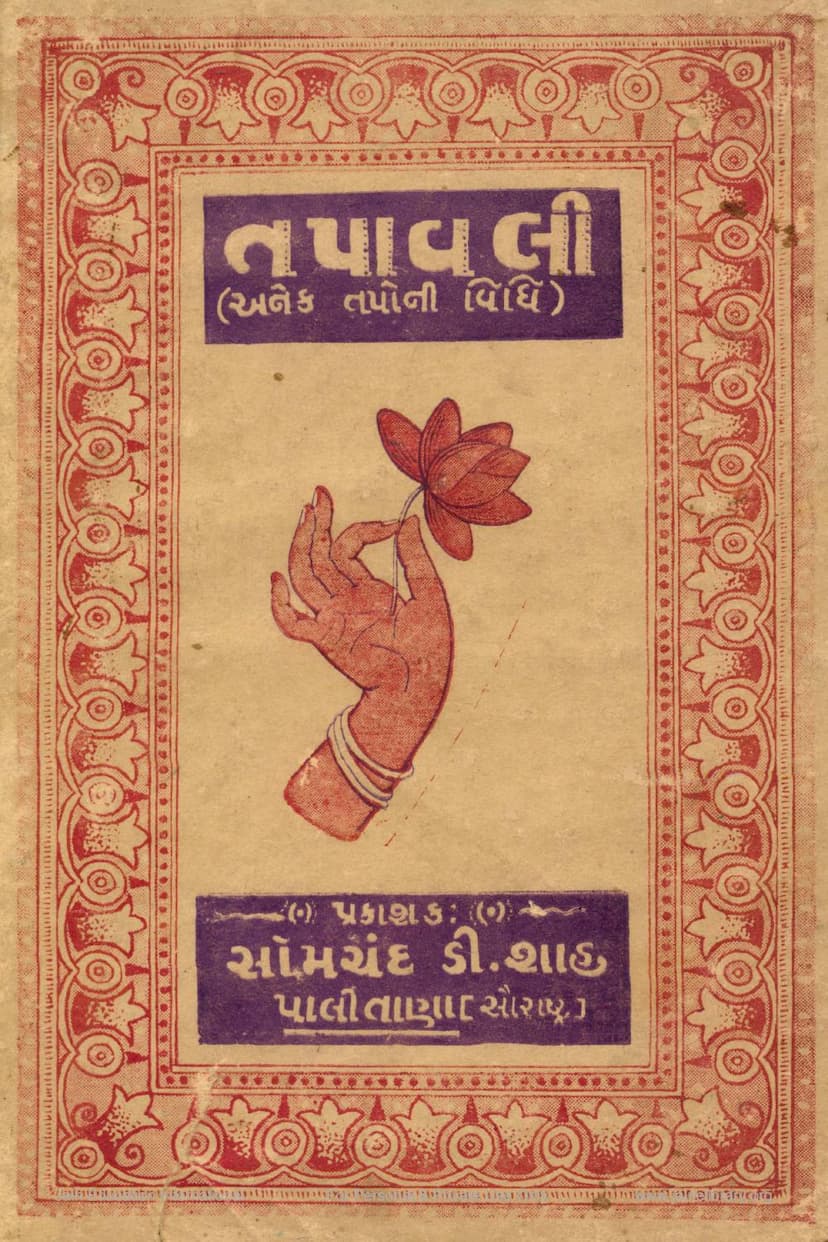Tapavali
Added to library: September 2, 2025

Summary
Certainly! I've reviewed the provided Gujarati text, which appears to be a table of contents or an index for a Jain text titled "Tapavali" (તપાવલી) by Somchand D. Shah. The text lists 162 different types of penances (taps) with their corresponding page numbers.
Here's a comprehensive summary in English, based on the text you provided:
Book Title: Tapavali (તપાવલી) Author: Somchand D. Shah Publisher: Somchand D. Shah Content: The text is a collection of rituals and procedures (vidhi) for 162 different Jain penances (taps).
Core Purpose: The book aims to provide guidance and detailed instructions for individuals (both ascetics and lay followers) who wish to perform various types of penances, which are considered crucial for spiritual purification and advancement in Jainism.
Key Aspects Highlighted:
- Importance of Dharma: The introductory pages (pages 3-4) emphasize the significance of religion (Dharma) in human life and highlight its four pillars: Charity (Dan), Right Conduct (Sheel), Penance (Tap), and Pure State of Mind (Bhav).
- Significance of Tap: Penance (Tap) is particularly lauded for its power to destroy karmic particles, eliminate diseases, bestow desired possessions, and ultimately lead to liberation (Moksha).
- Comprehensive Collection: The "Tapavali" contains the detailed procedures for 162 different types of penances, making it a comprehensive resource for practitioners.
- Guidance for Practitioners: The book is intended to be helpful for all "punyatmas" (virtuous souls) who engage in the practice of penance.
- Sources: The text acknowledges its compilation from "Ratnamahodadhi" (રત્નમહોદધિ) published by Khushalbhuvan Jain Upashray, Ahmedabad, and "Taptaratna Mahodadhi" (તપ રત્ન મહોદધિ) published by Bhavnagar Shri Atmavanad Jain Sabha.
- Structure of Penances: The book likely details the specific methods, durations, observances, and benefits of each penance. The included table of contents (pages 4-7) lists many of these, such as:
- Sensory and Emotional Control: Indraiyajay Tap (Control of senses), Kashayajay Tap (Control of passions).
- Ritualistic and Devotional Taps: Dharmachakra Tap, Kalayanka Taps (related to Tirthankara events), Navkar Tap, Panch Parmeshthi Tap, Nandishwar Tap, Pundarik Tap, Samavsaran Tap, Veer Ganadhar Tap, etc.
- Specific Observances: Chaumasi Tap, Ayambil Tap, Upavas (fasting), Ekasanu (one meal a day), Nivi (two meals a day), etc., are mentioned as components of various rituals.
- Taps for Specific Goals: Some taps are mentioned with implied or explicit benefits, such as destroying karmic matter (Karmasudan Tap), achieving liberation (Moksha), gaining knowledge (Gyan Tap), or achieving prosperity.
- General Observances: Page 8 outlines general rules applicable to most taps, including daily rituals like Pratikraman (confession), Padilehan (cleaning), Puja (worship), Devavandan (salutation to deities), taking vows (Pachchakkhan), Guru Vandan (salutation to the Guru), and knowledge worship.
- Specific Instructions: Pages 9-10 provide more specific guidelines, such as reciting mantras, performing specific number of Khama Samana (a form of respectful bowing), Kausagga (meditative standing posture), observing Brahmacharya (celibacy), and performing charity (Swamivatsalya). It also emphasizes performing penance for spiritual rather than worldly gains and controlling passions.
- List of Taps: The table of contents (pages 4-7, and further detailed sections) reveals a vast array of penances, covering a wide spectrum of Jain practices and traditions. Some examples from the provided snippets include:
- Ekaveesh Kalyanaka Tap (121 Penances related to Tirthankara events)
- Chandrayan Tap (Lunar penance)
- Tirthankar Vardhaman Tap (Penance related to Tirthankaras' growth)
- Paramabhushan Tap (Supreme adornment penance)
- Jin Deeksha Tap (Penance related to Initiation)
- Jin Gyan Tap (Penance related to Knowledge)
- Nishiddha Tap (Prohibited penance)
- Nijigishtha Tap (Self-control penance)
- Dhanaduharan Tap (Poverty removal penance)
- Panchamrit Tap (Five nectars penance)
- Panch Mahavrat Tap (Penance of five great vows)
- Nandi Ishwar Tap (Penance related to Nandi Ishwar)
- Pundarik Tap (Penance related to Pundarik Ganadhar)
- Samavsaran Tap (Penance related to the Samavsaran assembly)
- Shri Vir Ganadhar Tap (Penance related to Vir Ganadhar)
- Ashok Vruksha Tap (Ashok tree penance)
- Navkar Tap (Penance related to the Navkar Mantra)
- Chaudh Purva Tap (Penance related to the 14 Purva Agamas)
- Panch Parmeshthi Tap (Penance related to the Five Supreme Beings)
- Laghu Panchami Tap (Minor Panchami penance)
- Brihat Panchami Tap (Major Panchami penance)
- Ankavishthi Labdhi Tap (28 Siddhis penance)
In essence, "Tapavali" serves as a comprehensive manual for Jain ascetics and practitioners, detailing the multifaceted world of penance and its significance in achieving spiritual goals within the Jain tradition.